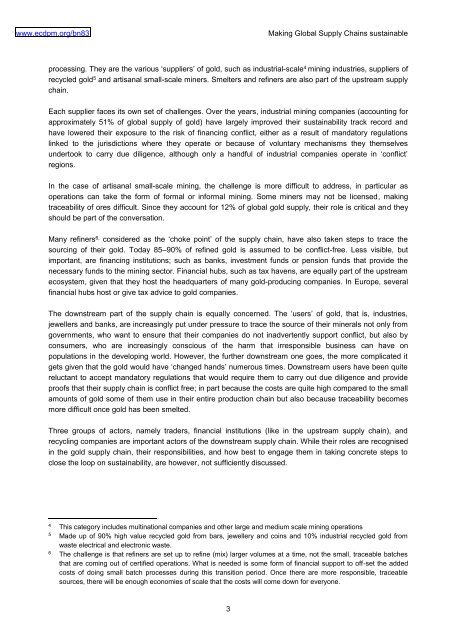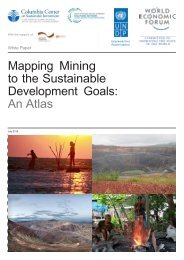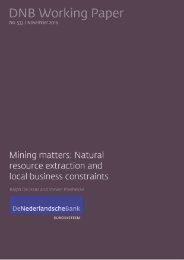Making Global Supply Chains sustainable The case of the gold sector
wuxhtv
wuxhtv
Create successful ePaper yourself
Turn your PDF publications into a flip-book with our unique Google optimized e-Paper software.
www.ecdpm.org/bn83<br />
<strong>Making</strong> <strong>Global</strong> <strong>Supply</strong> <strong>Chains</strong> <strong>sustainable</strong><br />
<strong>gold</strong>, such as industrial-scale 4 mining industries, suppliers <strong>of</strong><br />
recycled <strong>gold</strong> 5 and artisanal small-scale miners. Smelters and refiners are also part <strong>of</strong> <strong>the</strong> upstream supply<br />
chain.<br />
Each supplier faces its own set <strong>of</strong> challenges. Over <strong>the</strong> years, industrial mining companies (accounting for<br />
approximately 51% <strong>of</strong> global supply <strong>of</strong> <strong>gold</strong>) have largely improved <strong>the</strong>ir sustainability track record and<br />
have lowered <strong>the</strong>ir exposure to <strong>the</strong> risk <strong>of</strong> financing conflict, ei<strong>the</strong>r as a result <strong>of</strong> mandatory regulations<br />
linked to <strong>the</strong> jurisdictions where <strong>the</strong>y operate or because <strong>of</strong> voluntary mechanisms <strong>the</strong>y <strong>the</strong>mselves<br />
<br />
regions.<br />
In <strong>the</strong> <strong>case</strong> <strong>of</strong> artisanal small-scale mining, <strong>the</strong> challenge is more difficult to address, in particular as<br />
operations can take <strong>the</strong> form <strong>of</strong> formal or informal mining. Some miners may not be licensed, making<br />
traceability <strong>of</strong> ores difficult. Since <strong>the</strong>y account for 12% <strong>of</strong> global <strong>gold</strong> supply, <strong>the</strong>ir role is critical and <strong>the</strong>y<br />
should be part <strong>of</strong> <strong>the</strong> conversation.<br />
Many refiners 6, <br />
sourcing <strong>of</strong> <strong>the</strong>ir <strong>gold</strong>. Today 8590% <strong>of</strong> refined <strong>gold</strong> is assumed to be conflict-free. Less visible, but<br />
important, are financing institutions; such as banks, investment funds or pension funds that provide <strong>the</strong><br />
necessary funds to <strong>the</strong> mining <strong>sector</strong>. Financial hubs, such as tax havens, are equally part <strong>of</strong> <strong>the</strong> upstream<br />
ecosystem, given that <strong>the</strong>y host <strong>the</strong> headquarters <strong>of</strong> many <strong>gold</strong>-producing companies. In Europe, several<br />
financial hubs host or give tax advice to <strong>gold</strong> companies.<br />
<br />
jewellers and banks, are increasingly put under pressure to trace <strong>the</strong> source <strong>of</strong> <strong>the</strong>ir minerals not only from<br />
governments, who want to ensure that <strong>the</strong>ir companies do not inadvertently support conflict, but also by<br />
consumers, who are increasingly conscious <strong>of</strong> <strong>the</strong> harm that irresponsible business can have on<br />
populations in <strong>the</strong> developing world. However, <strong>the</strong> fur<strong>the</strong>r downstream one goes, <strong>the</strong> more complicated it<br />
<br />
reluctant to accept mandatory regulations that would require <strong>the</strong>m to carry out due diligence and provide<br />
pro<strong>of</strong>s that <strong>the</strong>ir supply chain is conflict free; in part because <strong>the</strong> costs are quite high compared to <strong>the</strong> small<br />
amounts <strong>of</strong> <strong>gold</strong> some <strong>of</strong> <strong>the</strong>m use in <strong>the</strong>ir entire production chain but also because traceability becomes<br />
more difficult once <strong>gold</strong> has been smelted.<br />
Three groups <strong>of</strong> actors, namely traders, financial institutions (like in <strong>the</strong> upstream supply chain), and<br />
recycling companies are important actors <strong>of</strong> <strong>the</strong> downstream supply chain. While <strong>the</strong>ir roles are recognised<br />
in <strong>the</strong> <strong>gold</strong> supply chain, <strong>the</strong>ir responsibilities, and how best to engage <strong>the</strong>m in taking concrete steps to<br />
close <strong>the</strong> loop on sustainability, are however, not sufficiently discussed.<br />
4<br />
This category includes multinational companies and o<strong>the</strong>r large and medium scale mining operations<br />
5<br />
Made up <strong>of</strong> 90% high value recycled <strong>gold</strong> from bars, jewellery and coins and 10% industrial recycled <strong>gold</strong> from<br />
waste electrical and electronic waste.<br />
6<br />
<strong>The</strong> challenge is that refiners are set up to refine (mix) larger volumes at a time, not <strong>the</strong> small, traceable batches<br />
that are coming out <strong>of</strong> certified operations. What is needed is some form <strong>of</strong> financial support to <strong>of</strong>f-set <strong>the</strong> added<br />
costs <strong>of</strong> doing small batch processes during this transition period. Once <strong>the</strong>re are more responsible, traceable<br />
sources, <strong>the</strong>re will be enough economies <strong>of</strong> scale that <strong>the</strong> costs will come down for everyone.<br />
3






